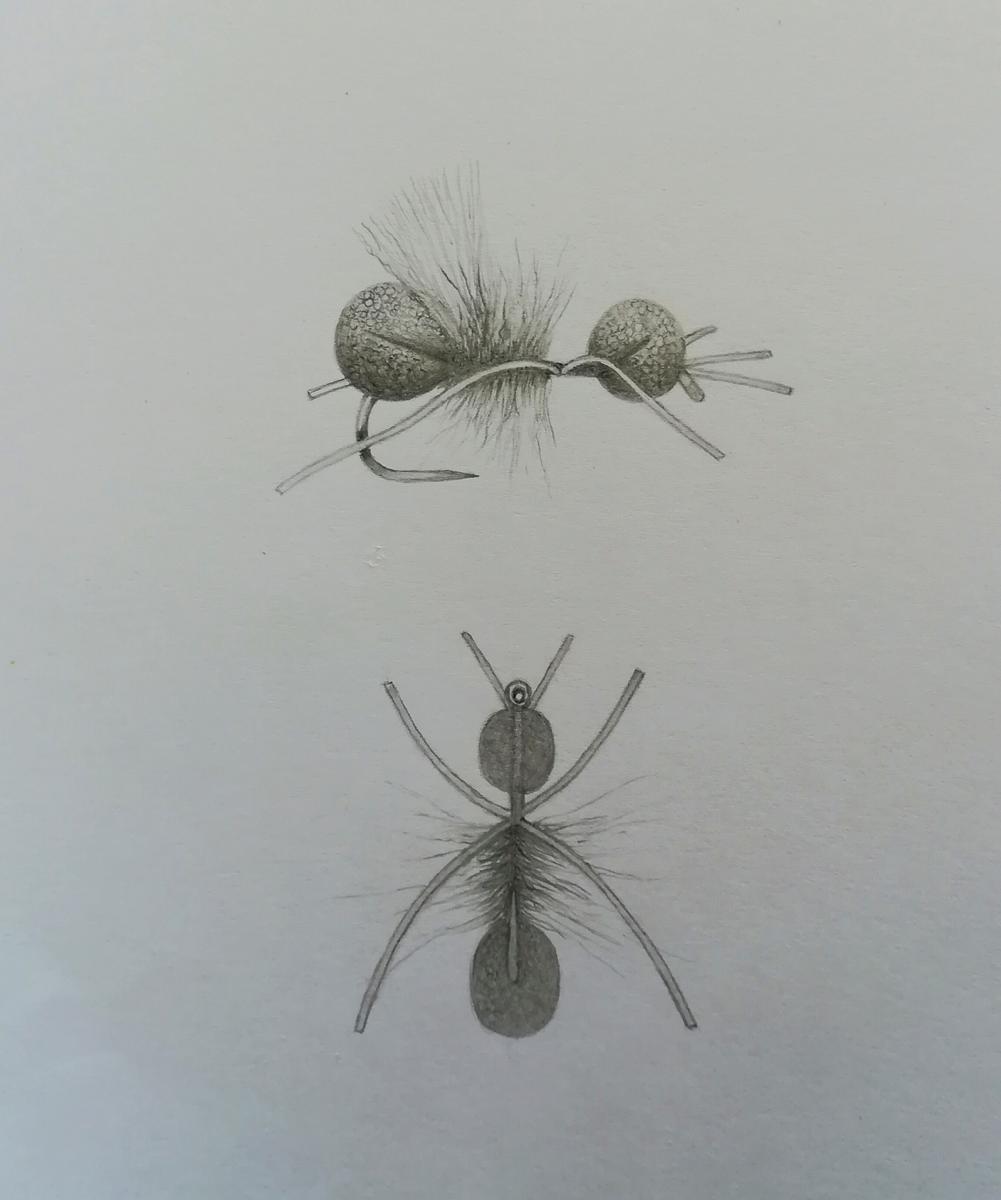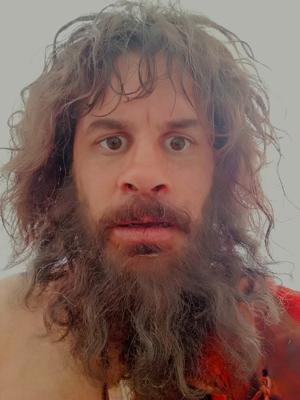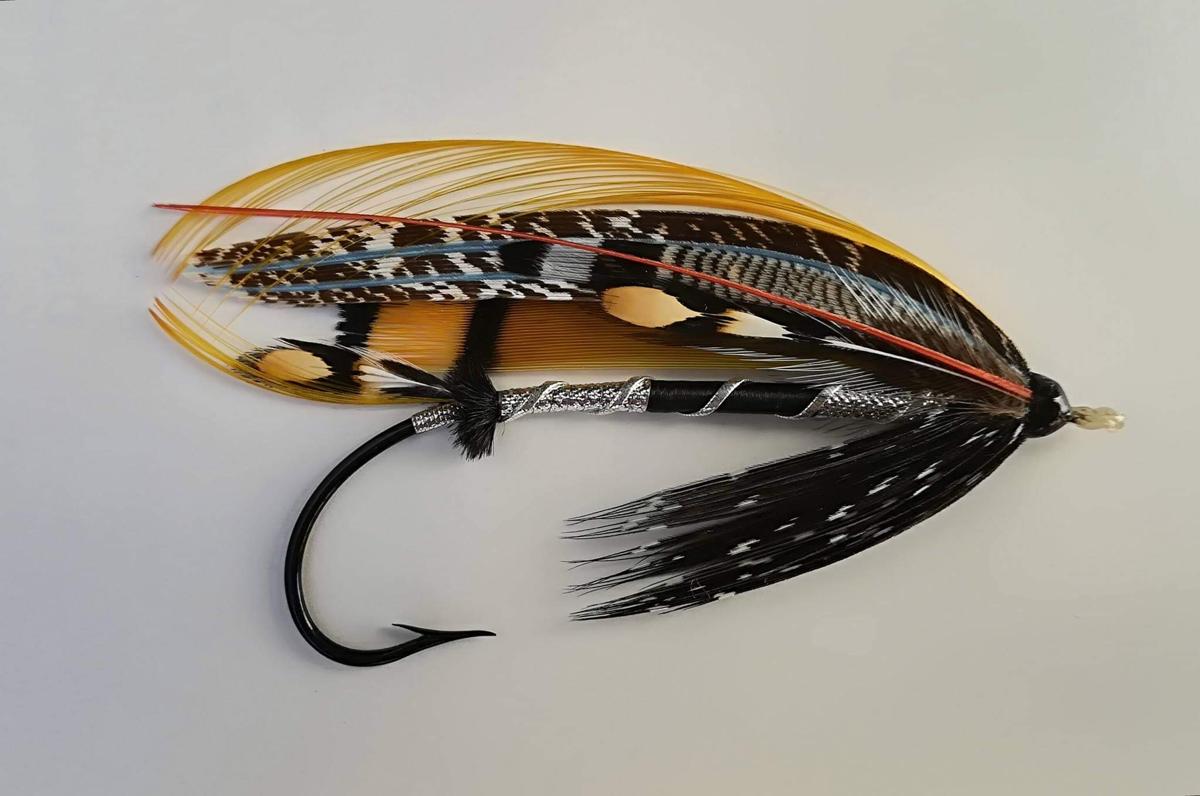
12 minute read
"EMBRACE THE CRAZY" WE SPEAK TO GORDON VAN DER SPUY
SAVS
Advertisement
I first met Gordon a few years back on an evening that, as far as this magazine is concerned, was fairly significant.
With a few beers in hand I popped by Terry A n d r e w s a t h i s ‘ T r o u t T a l k G l o b a l Headquarters’ to collect some hardwoods that he’d tracked down for me. I burst through the door and into the middle of one of Gordon’s fly tying classes just as he was instructing his class to draw a mayfly nymph.
I mumbled an apology and opened a beer as an excuse to stay and watch the man who was holding court wearing a pair of bright surfer's baggies, a shirt with a pattern seemingly designed to flush out latent epileptics and hair as wild as his hand gestures. I was introduced to him, Andrew Mather (who blinded me by not removing his weapons grade headlamp before looking up), and Ian Cox (who was in the corner tying a red eye damsel and not as much participating in the event as being present at it).
Gordon’s approach in having his students identify and draw naturals before tying them impressed me and has stayed with me. Over the last few years our paths have periodically converged and my respect for him, what he does and how he does it continues to grow.
He’s a difficult guy to sum up; as enigmatic as he is charismatic. With his first book on fly tying nearing completion we touched base with him to chat about it.
FFM: Where did the idea of a book come from?
GVDS: I've had the idea for a book for a while. There's nothing new in it per se but I do approach the subject from a fresh angle. Form follows function. You should be focussing on what you need the fly to do when you're fishing it and then tie it to do that. Too many people tie by numbers as it were. It's limiting.
I just feel life is short. If you're going to do something give it horns. Really go for it. If you fail you fail, so what?
FFM: Tell me about how you selected patterns. Are they things that float your boat currently or are they patterns that incorporate techniques that you think every fly tyer should master first? Where does one even start?
GVDS: The patterns were flies that appealed to me. They're all patterns that I have a personal story with. The idea has always been the ideas or concepts behind the patterns as opposed to just the patterns themselves. The patterns are merely a vehicle for the message.
FFM: We’re loving your drawings. This isn’t a side of you that we’ve seen before.
GVDS: As a kid I loved drawing. I'd draw cows, birds of prey, fruit bowls, my granny, the dog - whoever and whatever sat still long enough. I guess that's when my parents realised that I wasn't a standard-issue child. Luckily they embraced the crazy so it all worked out in the end.
My mom and dad used to drop me off on my mom's uncle’s farm in Ogies. I'd roam free on that place in school holidays adventuring and drawing as I went. I loved it.
FFM: In a world that is dominated by digital images why did you choose to go with drawings?
GVDS: The thing with drawings in tying manuals is that if they’re done right they should represent real proportion and give one a very real feel of the fly. It takes forever to work in this style but it conveys the sense of the flies very well. A 'Fra Diavolo' tied by Gordon Photo by Tom Sutcliffe

Drawings give more detail than a photo can. I can also manipulate the drawing easier than a photo.
The problem is as the drawing develops I find myself wanting to redo stuff.
FFM: Over the course of a few discussions with you the topic of writing keeps pulling through as a theme. Are you drawn to writing? Do you for example tell anecdotes in your book?
GVDS: I write out of necessity. I'm no great shakes as a writer. I'm no Deon Meyer but ja, I say it like I say it and I guess people appreciate the fact that I'm not trying to be smart - I’m just talking to them.
My book is full of stories and personal experiences. I don't view myself as anything special, I'm a boy from Witbank (was born there) who happened to smaak flyfishing. Writing has always been part of what I do. I have written two plays to date, one for an educational theatre company and the other for a corporate for ABSA

FFM: So is writing then part of your formal craft, I mean in terms of acting and theatre, and has it helped? Do you draw on your formal training outside of the theatre or off the screen?
GVDS: Acting definitely helped shape the way I communicate. It taught me how to communicate efficiently and effectively.
A writer should be true to their voice, say what you want to say and say it like you say it. You don't need to be Gierach, the world already has one, just be you.
FFM: When I write I get a sense that if I’m saying something that a thousand people have said before I shouldn’t even bother. I suppose t h a t i t s p e a k s t o authenticity in one’s writing. Is this something that you think about?
GVDS: I totally agree with you. Write if you have something to say.
Too many people think they're smart when they're writing. Self indulgence is crap. It's a bit like a beautiful girl who is aware of her beauty. It makes her less attractive whereas a fairly average looking girl can be super attractive because she's not trying too hard and just being cool. One should never force things. Just let it happen.
FFM: Tell us about what you're up to with Fly Fishing & Fly Tying. How did you get involved with them? Do you have a long view or is it part of a greater ambition?
GVDS: I emailed Mark Bowler, started chatting to him and we got on. I sent him a piece and he liked it. That's how it started.
I write for them because I think it'll be good exposure in terms of releasing my book eventually. Our market here is limited. One should be casting the net as wide as possible.
FFM: Tell me about Fanie? Has he gone to the big fish in the sky or as a character does he still have legs? I love poking fun at anything that even remotely looks like tweed or tea in china cups on a riverbank. Me and Fanie could braai lekker langs 'n dam saam.
GVDS: Fanie was really the brainchild of Flybru. I came up with the character but the concept is theirs. If they're ever keen to do it again I’ll be keen. It was great fun doing something slightly left field. I hate ordinary things. I love things and people who are off beat.
FFM: How did you come to being involved in the sport? What turns you on in terms of fishing? You do the Bokong annually, fish the Cape streams, etc. Are there places that stand out?

GVDS: I learned to fish in the Drakensberg at boarding school. I was in the choir school and music and trout fishing have a symbiotic relationship. A boy named Jan Theo Steenkamp was practicing his casting on the lawn. It looked cool. I asked him to teach me and that's where it started.
I love fishing for fish in unlikely places. I caught a trout in the middle of a desert a while back - thanks Leroy! But I’m not fussy, if it has fins I'll cast to it. I love fishing in the doggy park near my house. It has these mean-ass Cape kurpers that hijack a fly more than they take it. I love it!
Love the Bokong, it's my happy place. Chilling on that mountain flicking flies to fat yellows just does it for me.
FFM: I think, from the form follows function philosophy that I know a little of where you stand - but where do you stand? You tie full dress salmon flies in a tradition where it's all form; those things aren't even fished. Is there a sort of conflict that comes from that or are you able to reconcile the two approaches?
GVDS: Well, traditional classic salmon flies are still fished by a small group of people. They’re surprisingly effective. Spey flies with their Heron hackles move and pulse wonderfully, for example. There is something quite zen about dressing a nice classic and catching a fat silver salmon on it. It's not about just catching a fish, it's about the journey in getting there.
Tying classics is meditative once you get past the initial nuts and bolts phase. I love tying them because they challenge me. They also help one develop as a tyer. You can't tie classics and not improve as a tyer overall. They open your eyes up to certain things. Classics in a way shaped me as a tyer. They forced me to become technically better.
FFM: Are fly tying and flyfishing once again seeing a minor divergence? Not quite on the level of salmon flies, but do you also see a bunch of guys who tie like the masters but who actually don't have the fishing chops to back it up? I know guys who tie like hell but are pretty ordinary on a stream.
GVDS: Some people are great tyers and s u c k a s f i s h e r m a n a n d v i s a v e r s a . Occasionally you get someone who has the chops in all aspects.
Mark Krige is a classic example of that. The dude ties like a champ but is also a natural born fisherman. He is the type of guy who can catch trout with a broomstick, a piece of tippet and a soft hackle.
I'm not a particularly gifted fisherman so I don't pretend to be either. My joy of fishing isn't derived from how good I am at it. I just smaak it, there is something quite spiritual about spotting a fish, presenting a fly to it and then watching it eat the fly.
I think flyfishing and fly tying are extremely subjective. It is what you want it to be. It's a personal thing. I tie more than I fish but enjoy fishing just as much even though I tie better than I fish.

GVDS: I love acting but did get disillusioned with the industry and how it functions.
I wanted to do something useful so wrote a one man show titled "Dare to Dream”. I started performing it at schools but have also performed it to corporates who lack gees.
Positive energy is a great thing. Sometimes people just need a wake up call. The show is not conventional at all, it's a bit of a mix between a stand up comedy show and a motivational speech.
A lot of people never realised their full potential because they simply lack the courage and balls to chase what they want. Humans are good at settling and very few people achieve their higher calling. Life is short, best you grow a pair, go for it and milk it for all it's worth.
The show is worked out. I tested it out on my children and used them as a barometer regarding what works and what doesn't. Too many people underestimate their children. You can learn a lot from them!
FFM: On the subject of schools, are you still doing one-on-one tying classes?
GVDS: I love giving one-on-one classes and have a few regular students who I teach. I get more done teaching one on one. It's effective.
I think in a way I am a teacher more than anything else. Entertainment is the medium I use to convey a message. People retain info when they're engaged.
FFM: You’re a creative. An actor, tyer, illustrator, writer. But you’re also an organizer, administrator, networker, teacher, facilitator. Which is the real Gordon? Are you Fanie or the guy who ties salmon patterns that bring me close to tears sometimes? Is it something that you try to reconcile? Does it take ‘management’ or are you comfortable stepping in and out of roles as you go?
GVDS: I am whoever I need to be to get the job done but am fully aware that the journey is as important, if not more so, than the end goal. I always try to be in the moment I'm in. Things are easier when you compartmentalise things.
Too many people are blind to the world around them. I believe in the concept of being a significant human being. I'm at peace with who I am and who I have become, I'm far from perfect and have come to accept that that's just human.
Shakespeare said, "To thine own self be true". It's probably the best thing he ever wrote.
FFM: Someone said to once that “if you have to be there be all there”. It stuck with me and you certainly live it. So, back to where we started - the book.
GVDS: The book is a labour of love. So many books have been written on tying but I decided to write it because I felt there was a l o t t h a t p e o p l e w e r e n ' t s a y i n g o r communicating in terms of tying even though thousands of books have been written on the subject.
The book is a story as much as it is a book about tying. The message is solid. I have an amazing team working on it with me and that helps.
The nice thing about the book is that it is proudly South African. The idea is to release it internationally. The South African flyfishing community has a lot to offer the rest of the world. We box way above our weight category. We have world class tyers, guides, rod builders, outfitters etc. We need to be proud of that and punt it globally.
FFM: Thanks for sharing, Gords, it's been fun. All the best for the book, the show, the writing and for whatever you find yourself doing next.










